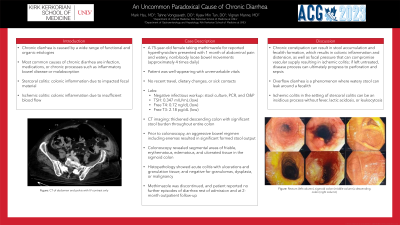Tuesday Poster Session
Category: Colon
P3119 - An Uncommon Paradoxical Cause of Chronic Diarrhea
Tuesday, October 24, 2023
10:30 AM - 4:00 PM PT
Location: Exhibit Hall

Has Audio

Mark Hsu, MD
Kirk Kerkorian School of Medicine at UNLV
Las Vegas, NV
Presenting Author(s)
Mark Hsu, MD1, Tahne Vongsavath, DO2, Kyaw Min Tun, DO1, Vignan Manne, MD1
1Kirk Kerkorian School of Medicine at UNLV, Las Vegas, NV; 2Kirk Kerkorian School of Medicine, Las Vegas, NV
Introduction: Chronic diarrhea is most commonly seen in cases of malabsorption, chronic inflammatory processes such as inflammatory bowel disease, medication side effect, functional disorders, or persisting infections. Here we present an extreme case of constipation resulting in stercoral colitis and ultimately ischemic colitis, resulting in an unusual presentation of chronic diarrhea in the setting of constipation.
Case Description/Methods: A 75-year-old female with bipolar disorder presented with a 1-month history of abdominal pain as well as watery, nonbloody diarrhea of approximately 4 times daily. She denied recent travel, dietary changes, or sick contacts. Stool ova and parasite, culture, and PCR were all negative for infectious etiologies. Serial lactic acid recordings were normal. Abdominal CT imaging showed a thickened descending colon with significant stool burden, and the patient required an aggressive bowel regimen including enemas to relieve the stool burden. Subsequent colonoscopy noted segmental areas of friable and ulcerated tissue in the sigmoid colon, with random biopsies showing ulcerations and acutely inflamed granulation tissue consistent with ischemic colitis. Tissue samples were negative for granulomas, dysplasia, or malignancy. The patient had no further episodes of diarrhea following the significant bowel movement during her admission, and the patient remained without diarrhea at a 2-month follow-up.
Discussion: The paradoxical presentation of diarrhea in the setting of constipation is often attributed to a phenomenon known as overflow diarrhea, where watery stool leaks around a fecalith. Overflow diarrhea is typically considered in acute, intermittent diarrhea but not chronic diarrhea, since fecaliths will eventually increase in size to seal off leaky edges and compress against colonic mucosa, resulting in inflammation of the colon known as stercoral colitis. However, stercoral colitis can rarely be complicated by ischemic colitis, which can be associated with persistent diarrhea. Our case highlights an extreme case of stercoral colitis complicated by ischemic colitis as a rare cause of chronic diarrhea, raising the importance of considering constipation as a paradoxical cause of diarrhea beyond an acute setting.

Disclosures:
Mark Hsu, MD1, Tahne Vongsavath, DO2, Kyaw Min Tun, DO1, Vignan Manne, MD1. P3119 - An Uncommon Paradoxical Cause of Chronic Diarrhea, ACG 2023 Annual Scientific Meeting Abstracts. Vancouver, BC, Canada: American College of Gastroenterology.
1Kirk Kerkorian School of Medicine at UNLV, Las Vegas, NV; 2Kirk Kerkorian School of Medicine, Las Vegas, NV
Introduction: Chronic diarrhea is most commonly seen in cases of malabsorption, chronic inflammatory processes such as inflammatory bowel disease, medication side effect, functional disorders, or persisting infections. Here we present an extreme case of constipation resulting in stercoral colitis and ultimately ischemic colitis, resulting in an unusual presentation of chronic diarrhea in the setting of constipation.
Case Description/Methods: A 75-year-old female with bipolar disorder presented with a 1-month history of abdominal pain as well as watery, nonbloody diarrhea of approximately 4 times daily. She denied recent travel, dietary changes, or sick contacts. Stool ova and parasite, culture, and PCR were all negative for infectious etiologies. Serial lactic acid recordings were normal. Abdominal CT imaging showed a thickened descending colon with significant stool burden, and the patient required an aggressive bowel regimen including enemas to relieve the stool burden. Subsequent colonoscopy noted segmental areas of friable and ulcerated tissue in the sigmoid colon, with random biopsies showing ulcerations and acutely inflamed granulation tissue consistent with ischemic colitis. Tissue samples were negative for granulomas, dysplasia, or malignancy. The patient had no further episodes of diarrhea following the significant bowel movement during her admission, and the patient remained without diarrhea at a 2-month follow-up.
Discussion: The paradoxical presentation of diarrhea in the setting of constipation is often attributed to a phenomenon known as overflow diarrhea, where watery stool leaks around a fecalith. Overflow diarrhea is typically considered in acute, intermittent diarrhea but not chronic diarrhea, since fecaliths will eventually increase in size to seal off leaky edges and compress against colonic mucosa, resulting in inflammation of the colon known as stercoral colitis. However, stercoral colitis can rarely be complicated by ischemic colitis, which can be associated with persistent diarrhea. Our case highlights an extreme case of stercoral colitis complicated by ischemic colitis as a rare cause of chronic diarrhea, raising the importance of considering constipation as a paradoxical cause of diarrhea beyond an acute setting.

Figure: (A) CT imaging showing significant stool burden
(B) and (C) Multiple ulcerations in the sigmoid colon noted during endoscopy
(B) and (C) Multiple ulcerations in the sigmoid colon noted during endoscopy
Disclosures:
Mark Hsu indicated no relevant financial relationships.
Tahne Vongsavath indicated no relevant financial relationships.
Kyaw Min Tun indicated no relevant financial relationships.
Vignan Manne indicated no relevant financial relationships.
Mark Hsu, MD1, Tahne Vongsavath, DO2, Kyaw Min Tun, DO1, Vignan Manne, MD1. P3119 - An Uncommon Paradoxical Cause of Chronic Diarrhea, ACG 2023 Annual Scientific Meeting Abstracts. Vancouver, BC, Canada: American College of Gastroenterology.
